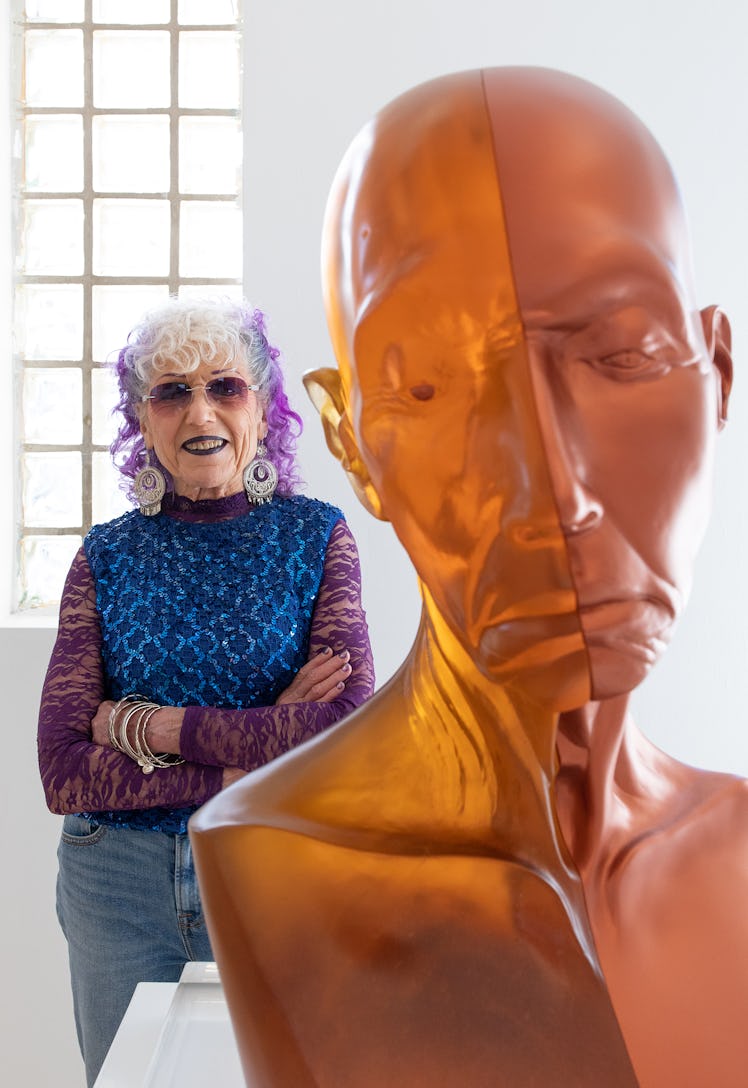Judy Chicago Confronts Her Younger Self
The pioneering feminist artist reflects on a year of major exhibitions and a lifetime of boundary-pushing work.

This past year, you had a major retrospective at the de Young Museum, in San Francisco, published an autobiography, and held exhibitions of your work across the country, including pieces from your “Birth Project” series, which felt particularly relevant given what’s been going on with the Supreme Court. Your recent show at Nina Johnson Gallery, in Miami, featured a lot of hands. What interests you about that part of the body?
I was starting to think about, How do I explore what connects us, as opposed to what separates us? What does it mean to be human? What do human beings do? We make signs, we make symbols, we make marks, we make gestures—it’s something that crosses gender, ethnicity, individual identities. I worked with glass, which allows you to see through surfaces. Well, that fits into my whole art practice, right? Looking at what’s missing, looking at what’s left out, looking beyond appearances. Glass literally allows you to do that.
Did writing your autobiography, The Flowering, change your perspective on your work or your life at all? I always wonder what it’s like when someone has a chance to take stock of her legacy.
It was very useful to me to be able to look back on some of my earlier, somewhat bizarre, ideas. I was really grateful for the opportunity to confront my younger self and say, “You were so off base, honey. Let me tell you, with the wisdom of maturity, you had it all wrong.” How many people get the opportunity to correct themselves?
Are there any young creatives working today whom you consider original?
The singer-songwriter Mary Gauthier. She’s done some work with incarcerated people, and she did an album with returning soldiers, male and female, where she became their voice, in a way. It’s really quite extraordinary. There’s a Native American artist named Rose B. Simpson, whom my San Francisco gallerist, Jessica Silverman, has been showing. She’s wonderful. I am also a big fan of Andrea Bowers. There are a lot of young artists; I try to keep up.
What do you think are the most significant challenges facing artists who are deploying a feminist perspective in their work?
I still hear stories from young women who tried, in school and graduate school, to be themselves in their work and were told, “Who do you think you are? Judy Chicago?” They have a lot of difficulty getting their subject matter and their way of working to be accepted—that has not gone away in art schools. But it’s true also for artists of color and artists of the middle class. All non–white male privileged students encounter difficulties in art schools. Then there’s getting out of art school with debt and having to have a full-time job, and having no time in your studio. Then there’s managing time in your studio, and then there’s trying to find your own voice in an art world that’s market-driven. There are challenges all along the way.
What would you consider your most original quality?
I guess that I’m so direct. It freaks out some people; other people can’t get enough of it.
Is there a person in your life who first taught you to break the rules?
My father. My father was a radical Marxist. I grew up around political discussions in our house, and everybody would speak, including the women. My parents believed in equal rights for women, which did not exactly prepare me for the real world. I had no idea the rest of the world didn’t feel like that. But I can still remember my father saying, “Everybody looks the same on the toilet, with their pants down.” So my father taught me about equality, and he taught me to judge people based on who they are, not on their supposed position, their power, whatever.
Judy Chicago, with her sculpture at Nina Johnson Gallery in Miami, December 2021.